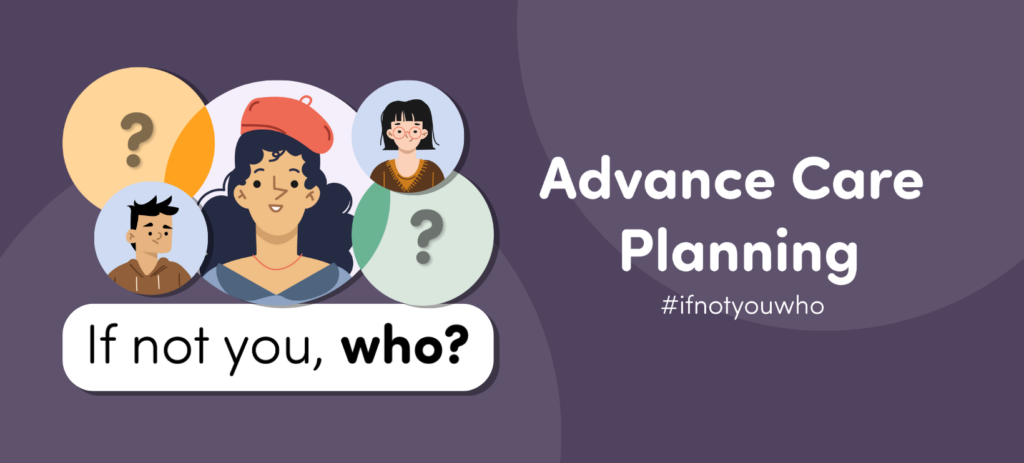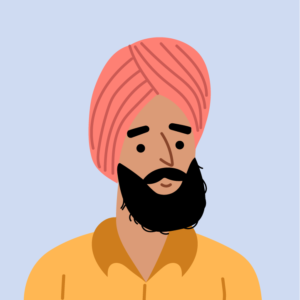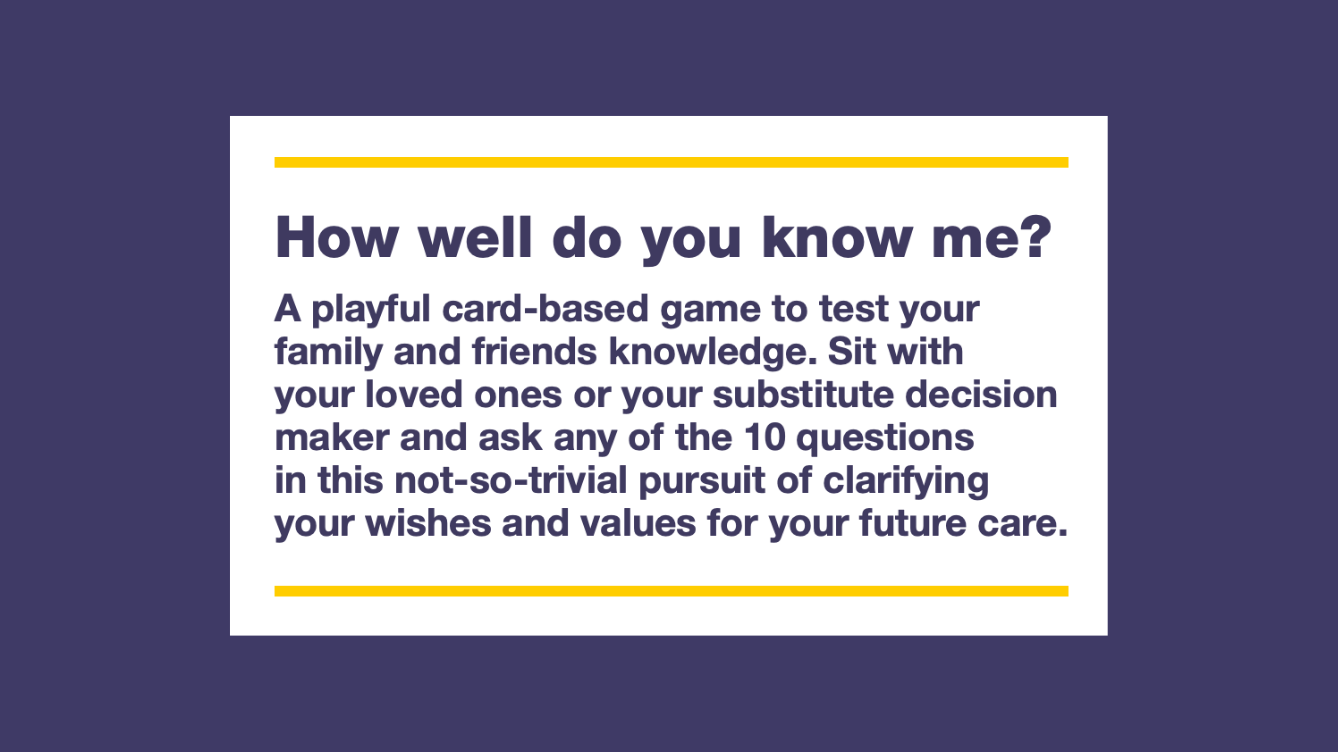
Step 1: Think about Advance Care Planning (ACP)
Reflection Prompts
Want to start planning for your future healthcare needs, but aren’t sure where to start? We created an online resource with some questions to guide you as you reflect on what matters most to you. If you want to record your answers, we’ll email your reflections directly to your inbox.
Step 2: Learn more about ACP and your health
Learn more about the steps of Advance Care Planning and explore our resources for more information to guide you through the process.
Step 3: Decide who, if not you
Advance Care Planning in Action
You have the power to choose who you trust to make healthcare decisions for you. They can be a family member, a friend, or anyone in your life that you trust to make the kinds of healthcare decisions you would want. Read these short stories to learn more about choosing someone to speak for you if you can’t speak for yourself.

Helen is 83 years young and has lived her whole life in the same small town. It’s where she feels at home, even after her children and her brother moved away. She keeps in touch with them and their families online through video calls. Helen lives alone in her apartment and sees a few friends every week for tea and bowling.
Even though she is healthy now, Helen knows that as she gets older, she could face health issues. She also knows that sometimes important health care decisions need to be made quickly, especially since she lives in a rural area.
So, who would make health care decisions for Helen if she couldn’t speak for herself? Her three children all live in other provinces and her brother lives an hour away. Helen feels that her children don’t live close enough to help. While her brother is closer, he sees the world very differently from Helen, and she doesn’t know if he would make decisions that she would want for herself.
That’s why Helen decided she wants her friend Susan to make health care decisions for her if she couldn’t make them for herself. They have known each other for many decades. Susan knows that Helen wants to stay in her community above all else because that’s where she feels safe and most at home. Helen trusts Susan to respect her wishes, and to keep her family updated on her health.

Michael is in his late 50s and lives with multiple chronic illnesses. He is an outgoing and vibrant trans man with a group of friends and chosen family that supports him. He has lived authentically as a man for many decades. Though he is estranged from his biological family, Michael built his own family and community that loves and supports each other.
Living an authentic life on his terms and having control over his care are very important to Michael. That is why he chose his friend Dee to make health care decisions for him if he couldn’t make them himself.
Michael considers Dee to be a part of his family. They helped him with care needs in the past and are familiar with his medical history. They also share similar values. Dee and Michael have both discussed how they define “a good life” for themselves. After those conversations, Michael knows that he can trust Dee to advocate for him to receive the care that he would want if he couldn’t speak for himself.

Ajit came to Canada from India 2 years ago. He enjoys his work at a retirement home and is improving his English through evening classes.
Ajit met his friend Moraa, another newcomer, at an English class. She introduced him to new friends who volunteer and study English together. Moraa’s support has helped Ajit to build his new life.
Ajit’s cousin Dalip came to Canada 7 years ago. He is Ajit’s only close relative here. They lead very different lives, but both value their shared ties to family, faith, and culture.
Through his work, Ajit sees how important it is to plan for your future health and personal care needs. Planning ahead helps your family and health care team make choices that align with your wishes and take better care of you. So, he asked himself who he would trust to make health care decisions for him if he couldn’t make them himself.
While Moraa is an important part of his life in Canada, Ajit would want the person making health care decisions for him to be connected to his family, faith, and culture. That’s why he wants and trusts Dalip to make health care decisions for him if he couldn’t speak for himself.

Monique has owned her own business for over 25 years. She is active in her local Black business leaders’ group and mentors other Black entrepreneurs. Monique lost her husband 4 years ago to heart disease. Together, they raised their now adult children Samuel and Emma.
With her siblings, Monique provided care for her parents at home as they reached the end of their lives. Family coming together to care for aging relatives is very important in her culture. A value she is also passing on to her children.
Monique trusts her children to make health care decisions together for her if she can’t speak for herself. She values the warmth and kindness that her son inherited from his father. Monique also loves the pragmatic optimism that she shares with her daughter. She feels that Samuel and Emma would be best equipped to make care decisions for her as a team.
That’s why Monique knows it is very important to discuss her wishes for her future health care with both her children. She doesn’t want decisions about her care to be a source of conflict between them. Monique wants Samuel and Emma to have a shared sense of what matters most in her life, and what that means for her future health care.

Layla is the incredible mom of two young kids, Ava and Jonas.
Raising her kids alone hasn’t been easy, especially since Layla’s family lives across the country. Thankfully, she can count on neighbours and friends for support.
Layla has plans about who would care for Ava and Jonas if something were to happen to her. But, who would make health care decisions for Layla if she couldn’t speak for herself?
Layla wouldn’t want her mom or her brother making important decisions for her care from so far away.
Luckily, her friend Nicole lives nearby. Nicole knows that Layla values being a part of Ava and Jonas’ lives, and that she would do anything to be there for her kids. Layla trusts that Nicole would make choices for Layla’s care that she would want if she couldn’t speak for herself.
Step 4: Talk about your wishes
Conversation Starters
The hardest part is often starting the talk. Here are some ways to start the conversation.
Be Straight Forward
I need your help with something …
Knowledge Share
I was at a workshop today and I would like to share what I learned with you.
Reflection
I was thinking about what happened to___________ and it made me realize …
Proactive Planning
Right now, I’m healthy, but I want to think ahead and be prepared if something unexpected should happen …and how we might want to handle that situation.
What Matters Most
I think it’s really important that people who matter to me know what’s important to me about my health care.
In The Moment
Right now, I’m living with_______ illness, and I expect ________. Is this what you understand too?
Clarification
I want to make sure you understand and could honour my wishes.
Thinking Ahead
I want you to be prepared if you had to make decisions on my behalf.

